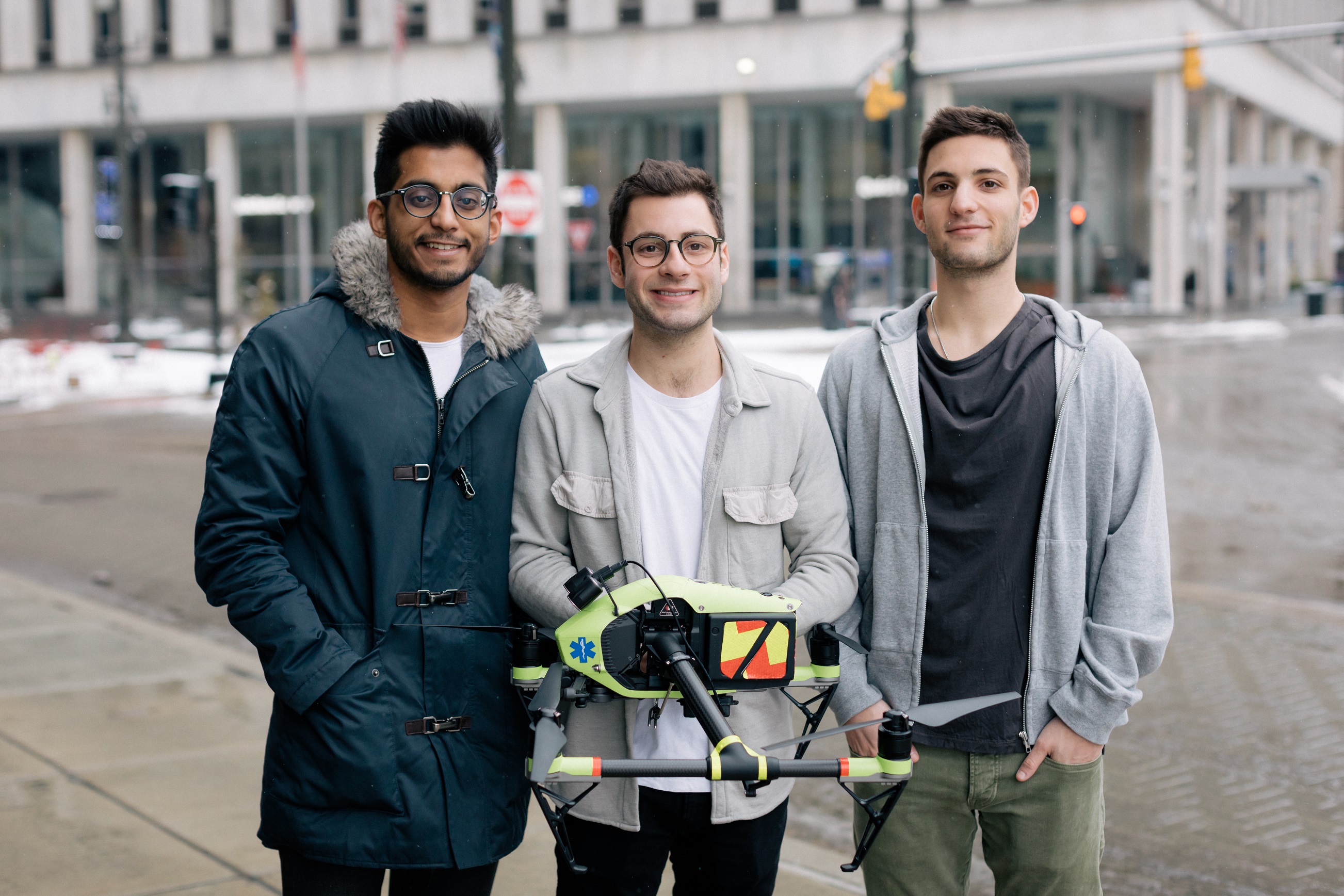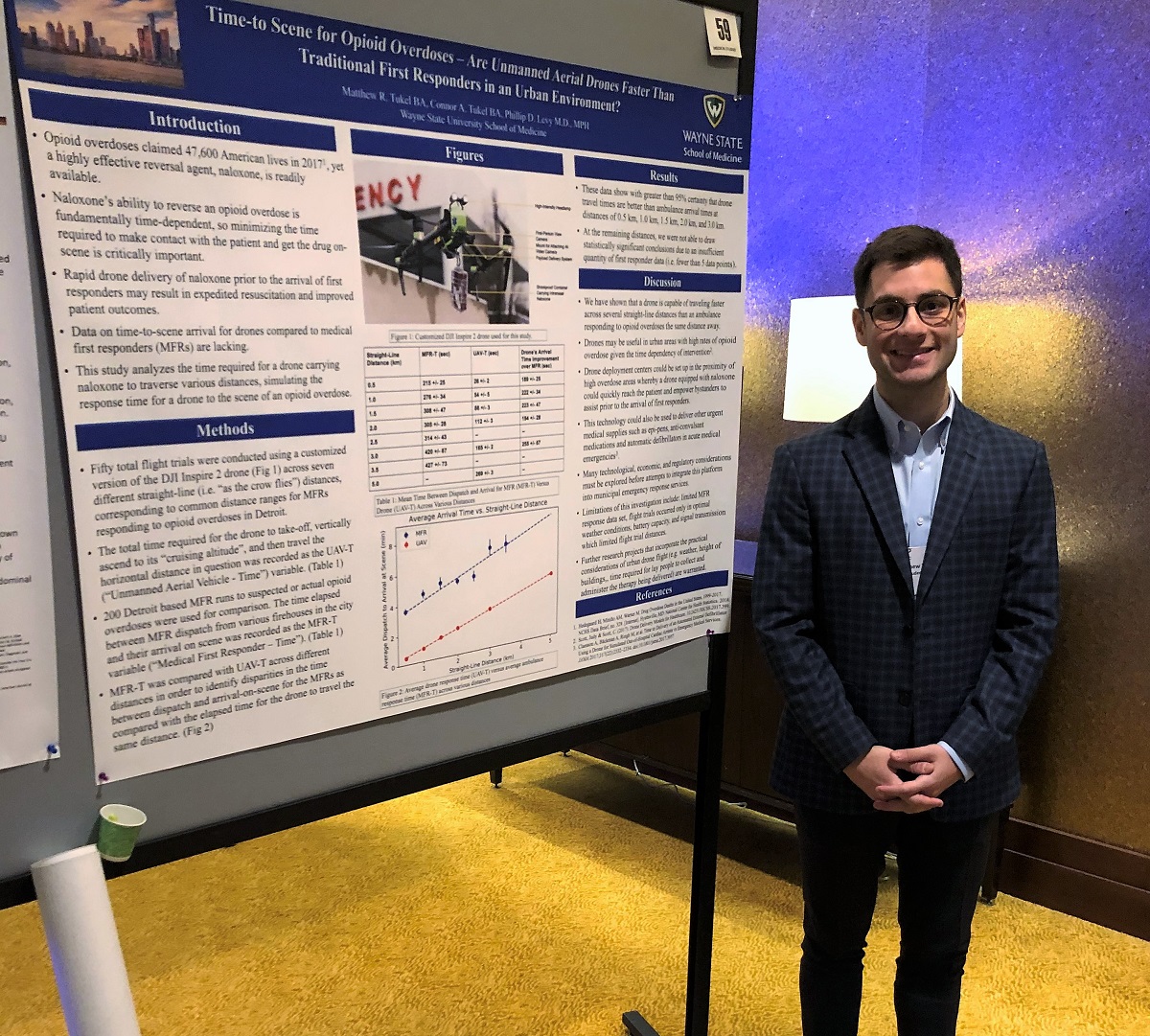
Matthew Tukel’s fascination with drones has led to yet another milestone in his pursuit of designing and implementing a drone-based health care delivery system in urban and rural settings.
The article, “Time-to-scene for opioid overdoses: Are unmanned aerial drones faster than traditional first responders in an urban environment?” was published in the journal BMJ Innovations. It’s the first publication for Tukel, a fourth-year medical student at the Wayne State University School of Medicine.

(Click here for a video about the drone project)
The article proves that a specially-equipped drone carrying the opioid overdose reversal drug Naloxone, or Narcan, is capable of traveling several ranges of straight-line distance faster than an ambulance, leading to expedited resuscitation and improved patient outcomes. Tukel determined with 95% certainty that drone arrival times were discernibly quicker than ambulance arrival times at all distances where sufficient data were available to perform statistical comparisons including 0.5 km, 1 km, 1.5 km, 2 km and 3 km.
Tukel and his brother, Connor, a medical student in New York, wrote the article with Chicago physics doctoral student Robert Weinbaum, and with assistance from mentor Phillip Levy, M.D., M.P.H., an Emergency Medicine physician and WSU’s assistant vice president of Translational Science and Clinical Research Innovation.
The goal is for their drone to work hand-in-hand with first-responders. According to the article, Naloxone’s ability to reverse an opioid overdose is fundamentally time-dependent. The customized drone model – the DJI Inspire 2 with high-intensity headlamp, first-person view camera, payload delivery system and shockproof container for carrying intranasal naloxone – is applicable in cities where ambulances do not satisfy the number of patients who need services.
“Publication is a very big deal for us,” Tukel said. “Back when we first started pitching the concept, we were met with some funny looks and a fair amount of skepticism. While we understood that it was an ambitious undertaking, we were committed to taking the idea from the drawing board to a fully-operational vehicle suitable for conducting research. This peer-reviewed publication lends a certain amount of objective validation to the idea, so that as we pursue the next steps and pursue additional funding/academic support, we will no longer just be pitching a theoretical idea.”
This latest accomplishment, while years in the making, is just the beginning, he added. The students are also thinking about additional uses for their drone technology.
“Rapid delivery of pre-hospital medication is critical in many life-threatening situations. As such, we intend to prove that this platform is capable not just of delivering Narcan, but any type of medication or device that could be used to save someone’s life,” he said.
They will also explore how the technology can be used to improve certain inefficiencies in the transport of medical supplies and biological specimens, including how drones can be used to enable more timely delivery of human organs to transplant centers after they have been procured, minimizing ischemic time and decreasing the number of unusable transplant organs.
“While we have come a long way in demonstrating the viability of this solution, there is still more that needs to be done,” Tukel said. “For one, legislation still does not permit the use of commercial drone delivery. Thus, while we continue to refine our vehicle, we must simultaneously advocate for this technology and the value it brings to patients and consumers.”
Tukel joined WSU as part of Medstart, an eight-year bachelor of science/medical degree program in collaboration with the Irvin D. Reid Honors College and the School of Medicine. He is the third generation in his family to attend the School of Medicine. His father and grandfather are also physicians who graduated from WSU.
“Matthew is a passionate resident of Detroit and has been extremely active at WSU and in the community. He received the Donnelly Award for most significant undergraduate contributions to Wayne State,” said Diane Levine, M.D., FACP, a professor and vice chair of Education for the Department of Internal Medicine. “Matthew has always been an innovator. He is fascinated with drones and has channeled his energies to make a difference in the city.”
Tukel and friend Albert Jose helped found Detroit Aerial Innovations while taking undergraduate classes at WSU. They wanted to enhance and supplement student education through an extensive hands-on curriculum of unmanned aerial vehicles, learning the basics of drone technology – what they’re made of, how to build them and how to fly them – in a safe and controlled laboratory environment.